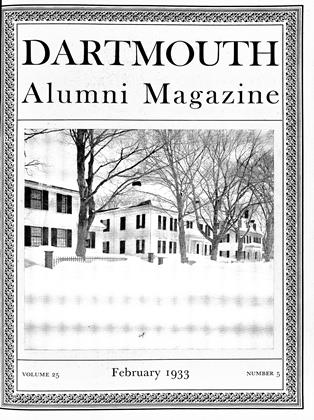ByCharles Downer Hazen '89, Henry Holtand Company, New York. Two volumes.
The history of the French Revolution cannot be satisfactorily told in brief compass. Anything in the shape of a single volume is bound to be merely an essay or a manual. At least two or three volumes are required to tell the story and to describe the stupendous changes it wrought in the life of France and of Europe.
A hundred years ago Carlyle saw the need and the opportunity for a history on that scale. His French Revolution is a literary masterpiece, a rhapsody, but not a history. It affords only occasional assistance to one who seeks to comprehend the French Revolution. Fifty years after Carlyle, a young Oxford scholar, Henry Morse Stephens, attempted the same task, intending to accompilsh it in three volumes. But he finished only two and in them he barely reached the half way point. His failure to complete his task has long been a matter of regret among scholars. In the whole field of modern European history there has been no one book more imperatively needed than a good history of the French Revolution in about two or three volumes addressed to the English speaking world.
This need has been met by Charles Downer Hazen '89. His French Revolution is in two volumes of moderate size, amounting to a little over a thousand pages. Writing on that scale he has been able to tell the story with enough detail to make the narrative thoroughly interesting and to include a sufficiently extended description of the most important changes brought by the Revolution so that the reader can gain an adequate realization of the way in which it transformed France and much of Europe.
The most distinctive characteristics of Professor Hazen's book are its sound scholarship, its fortunate conception of the task to be performed, and its interesting style.
The materials bearing upon the Revolution are so vast in amount that no one scholar can know them all at first hand. The most that can be expected of any book dealing with the Revolution as a whole is that its author shall base much of his knowledge on a study of the sources and draw the remainder of it from a judicious selection among the best secondary accounts. That test Professor Hazen meets in full measure. In a good many passages it is easy to see that he is in the main following the lead of someone authority, but it is always a good one and is used with discrimination.
Until quite recently historians have concentrated their attention almost exclusively upon political and military matters. The tendency now is to play up the economic and social elements. It is a signal merit of Professor Hazen's book that, while the main theme is still political, he has contrived to work in a good deal about the economic life of France during the Revolution. This has been done with great skill. It is not, as in many recent books, by the insertion of separate chapters which deal with the economic life as if it were something apart, but is accomplished by bringing it into the general narrative as a factor that helps to explain the course taken by events.
The style of the book is exceptionally good. Professor Hazen has an unusual aptitude for picking out the salient things and laying them before his readers in interesting fashion. He never indulges in purple patches nor in glittering phrases. His narrative always flows along in a simple, natural fashion that gets and holds attention. The book will appeal strongly to Dartmouth men.
 View Full Issue
View Full Issue
More From This Issue
-
 Article
ArticleDeath
February 1933 -
 Article
ArticleHANOVER BROWSING
February 1933 By Rees Higgs Bowen -
 Article
ArticleA PRACTICING LAWYER
February 1933 By George M. Morris 'II -
 Class Notes
Class NotesClass of 1910
February 1933 By Harold P. Hinman -
 Class Notes
Class NotesClass of 1926
February 1933 By J. Branton Wallace, Ritchie C. Smith -
 Class Notes
Class NotesClass of 1929
February 1933 By Frederick William Andres, Mace Ingram, Bill Keyes
Frank Maloy Anderson
-
 Books
BooksGUERNSEY CENTER MOORE FOUNDATION LECTURES
April, 1923 By FRANK MALOY ANDERSON -
 Books
BooksVan Winkle, '07
DECEMBER 1927 By Frank Maloy Anderson -
 Books
BooksSINCE THE CIVIL WAR
May 1936 By Frank Maloy Anderson -
 Article
ArticleMr. Anderson's List
November 1939 By Frank Maloy Anderson -
 Books
BooksFRANCE 1940-1942, A COLLECTION OF DOCUMENTS AND BIBLIOGRAPHY.
November 1942 By Frank Maloy Anderson -
 Books
BooksFACULTY PUBLICATIONS
November, 1025 By Franklin Mcduffee, Frank Maloy Anderson
Books
-
 Books
BooksFaculty Articles
JANUARY 1965 -
 Books
BooksNEVER SAY DIET.
November 1954 By ALBERT I. DICKERSON '30 -
 Books
BooksA GENERATION OF ILLUSTRATORS AND ETCHERS.
January 1961 By ELLEN MARY JONES -
 Books
BooksCourting Catastrophe
May 1981 By Frederick J. Hooven -
 Books
BooksThe Hole Truth
SEPTEMBER | OCTOBER 2020 By Kevin Nance -
 Books
BooksGREAT ENTERPRISE: GROWTH AND BEHAVIOR OF THE BIG CORPORATION.
April 1956 By WILLIAM A. CARTER


